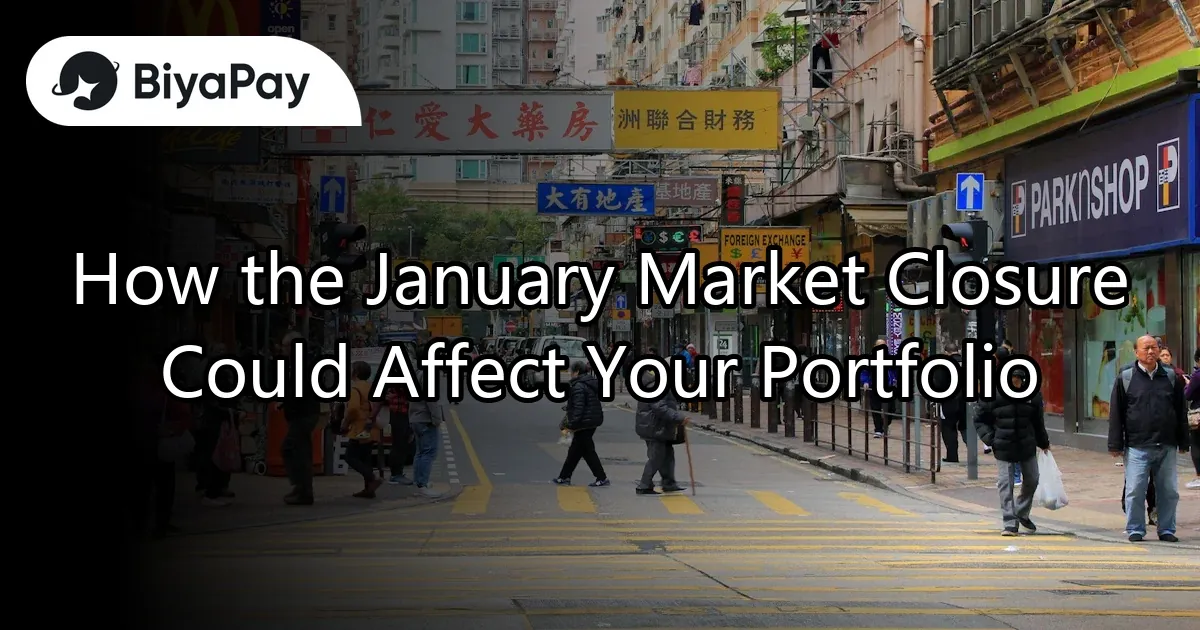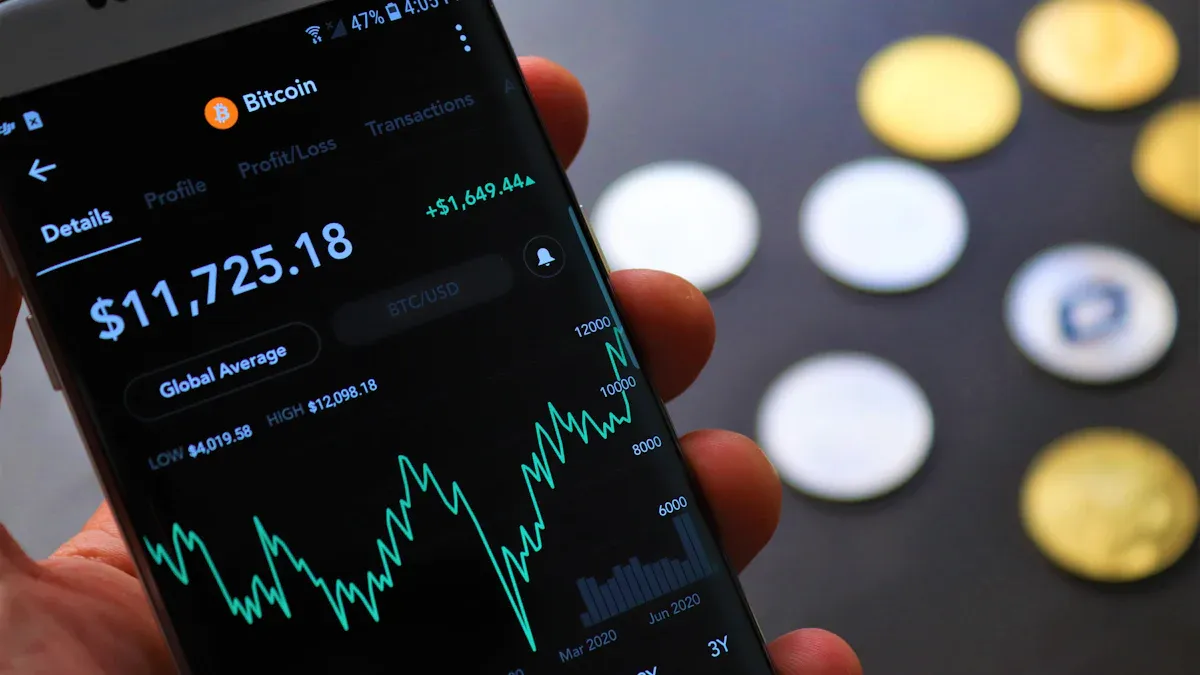- EasyCard
- Trade
- Help
- Announcement
- Academy
- SWIFT Code
- Iban Number
- Referral
- Customer Service
- Blog
- Creator
How the January Market Closure Could Affect Your Portfolio

Image Source: pexels
You might wonder, is the stock market open on january 9 2025? The answer is no. The US stock market will close to honor the National Day of Mourning for former President Jimmy Carter. This closure can change how you manage your portfolio and handle trades. Researchers at MIT Sloan found that market closures and trading halts can increase price swings and selling pressure as the market nears a shutdown. Other studies show that stocks often rise before a break but can drop after trading resumes.
You need to know which markets stay open, how your trades settle, and what steps help protect your investments during this time.
Key Takeaways
- The US stock market will be closed on January 9, 2025, for the National Day of Mourning, so no trading will occur on that day.
- Bond and futures markets will operate with limited or early hours, so plan your trades accordingly to avoid missing opportunities.
- Trades made on January 8 will settle normally on January 10, and trades on January 10 will follow the usual settlement cycle.
- Market closures can reduce liquidity and increase trading costs, so prepare your trades in advance and expect possible price swings.
- Stay informed by monitoring official announcements and keep your portfolio flexible to adapt quickly to market changes.
Is the Stock Market Open on January 9, 2025?
US Equity Markets Status
You may ask, is the stock market open on january 9 2025? The answer is clear: all major US equity markets, including the New York Stock Exchange (NYSE) and Nasdaq, will close on January 9, 2025. This closure honors the National Day of Mourning for former President Jimmy Carter. No trading will take place for US stocks or options on this day. You cannot buy or sell shares on these exchanges until they reopen.
This closure follows a long tradition. US stock exchanges have closed for national days of mourning in the past, such as for Presidents Ronald Reagan and George H.W. Bush. These events show respect and allow the nation to pause and reflect.
You should also know that some companies, like Walgreens Boots Alliance and Constellation Brands, have moved their earnings announcements from January 9 to January 10. The federal government will close, and agencies like the Census Bureau will delay data releases. These changes can affect how you plan your trades and manage your portfolio.
Here is a quick summary of the trading status for January 9, 2025:
- NYSE (Equities): Closed
- Nasdaq (Equities): Closed
- CBOE (Options): Closed
You may notice that the question, is the stock market open on january 9 2025, comes up often. The answer remains the same: US equity markets will not open for trading.
Bond and Futures Markets
While US stock markets close, some other markets will operate with changes. The US bond market will open but close early at 2:00 PM Eastern Time. This early close follows the recommendation from the Securities Industry and Financial Markets Association (SIFMA). If you trade bonds, you need to finish your transactions before the early close.
Futures markets, such as those run by CME Group and ICE, will have modified hours. Some futures products will close early, while others may keep regular hours. You should check the trading schedule for each product you hold. Clearinghouses like CME Clearing and the Options Clearing Corporation will remain open, so some settlement and clearing activities will continue even though equity trading stops.
The table below shows the status of major US markets on January 9, 2025:
| Market Type | Trading Status on Jan 9, 2025 | Settlement Status | Source/Note |
|---|---|---|---|
| NYSE (Equities) | Closed | N/A | Official ICE announcement |
| Nasdaq (Equities) | Closed | N/A | Nasdaq press release |
| CBOE (Options) | Closed | N/A | CBOE official notice |
| Bond Market (USD) | Early close at 2:00 PM ET | Open | SIFMA recommendation |
| Futures (CME) | Modified/early close for some products | Open | CME Group notice |
| Futures (ICE) | Early close on some products | Open | ICE Futures notice |
| DTCC (Clearing) | N/A | Open | DTCC unscheduled market closing guide |
| OCC (Options Clearing) | N/A | Open | OCC unscheduled market closing guide |
Tip: Always check the official trading calendars and announcements before making decisions. Market schedules can change quickly during special events.
If you wonder, is the stock market open on january 9 2025, remember that only some markets will operate, and most will have limited hours. You need to plan your trades and settlements with these changes in mind.
How Settlement Works During the Closure
Settlement for Trades on January 8
You may wonder what happens if you trade stocks on January 8, 2025, right before the market closure. The answer is simple. The US stock market uses a T+2 settlement cycle. This means your trade settles two business days after the trade date. The Securities and Exchange Commission (SEC) explains that most securities transactions follow this rule. If you buy or sell a stock on January 8, your trade will settle on January 10, 2025.
January 9, 2025, is not a trading day, but it still counts as a valid settlement day. You cannot place new trades, but your previous trades can still settle. The Nasdaq Equity Corporate Actions Alert confirms this rule. It states that January 9 is not a valid trade date, but it is a valid settlement date. You do not need to worry about delays for trades made on January 8. Your shares or cash will move as usual.
Note: If you trade government securities or stock options, the settlement cycle may be different. Some of these products settle the next business day. Always check with your broker for details.
Here is a quick summary:
| Trade Date | Settlement Date | Market Status on Settlement Date |
|---|---|---|
| January 8, 2025 | January 10, 2025 | Market Open |
Settlement for Trades on January 10
When the market reopens on January 10, 2025, you can trade as usual. Any trades you make on this day will follow the normal T+2 settlement cycle. This means your trades will settle on January 13, 2025. The Nasdaq Equity Trader Alert explains that January 10 trades settle on January 13, with no changes to the usual process. The alert also notes that CME Clearing and other clearinghouses will operate normally.
You do not need to take extra steps for trades on January 10. The market closure on January 9 does not affect the settlement of trades made after the closure. Your broker will process your trades and settlements as they do on any regular business day.
Tip: If you have questions about a specific trade or settlement, contact your broker or the market operations team. They can help you understand the exact timing for your transactions.
Here is a simple timeline for your reference:
- January 8, 2025: Last trading day before closure. Trades settle on January 10.
- January 9, 2025: Market closed. Valid settlement date, but no trading.
- January 10, 2025: Market reopens. Trades settle on January 13.
By understanding these rules, you can plan your trades and manage your portfolio with confidence during the January market closure.
Impact on Trading, Liquidity, and Costs

Image Source: pexels
Liquidity and Trading Costs
You may notice that trading activity often changes before a market closure. Liquidity tends to concentrate at the end of the trading day. The New York Stock Exchange (NYSE) reports that large trades usually happen with less market impact during the closing auction. For example, the NYSE closing auction averages $18.9 billion traded daily. This event helps minimize costs for big trades. S&P 500 stocks show very small price changes, even with large auction sizes. Academic research shows that closing auctions now make up a bigger share of daily trading volume than in the past. This shift means you may see lower trading costs during the auction, but sometimes prices can move more for smaller stocks.
You should also know that market closures or stress events can sharply reduce liquidity and raise trading costs. Unlike the end of the month, when liquidity improves and bid-ask spreads narrow, closures like January 9, 2025, often cause the opposite. During these times, bid-ask spreads can widen, and it may cost more to trade.
- Liquidity and trading costs often get worse during closures or stress events.
- Bid-ask spreads may double, and market depth can drop sharply.
- Price impact for large trades increases, especially for less liquid securities.
Delays and Order Execution
When the market closes, you cannot place new trades. Orders you submit before the closure will not execute until the market reopens. This delay can affect your ability to react to news or price changes. If you need to buy or sell quickly, you may face higher costs or less favorable prices when trading resumes. You should plan your trades ahead of time and check with your broker about order handling during closures.
Options and Event Contracts
Options and event contracts behave differently during disrupted sessions. Market disruptions, such as those seen during the COVID-19 pandemic, often result from strong selling pressure and sudden liquidity shocks. Dealers may reduce their exposure, which can make it harder for you to trade options or event contracts at fair prices. Announcements about market events can also move prices, even before trading resumes. You may see larger price swings and less predictable behavior in these markets during closures. If you hold options or event contracts, you should monitor announcements and be ready for increased volatility.
Steps to Prepare Your Portfolio

Image Source: pexels
Plan Trades in Advance
You can reduce stress during a market closure by planning your trades early. Review your portfolio and decide which trades you want to complete before the market closes. Many investors choose to focus on high-quality assets and keep their risk exposure modest when volatility rises. You might also consider rebuilding your portfolio by adding alternatives to stocks and bonds. This approach can help your investments stay strong during market disruptions.
- Diversify across different asset classes and regions. No single asset class leads forever.
- Use strategies like the All Weather portfolio, which aims to perform well in many economic conditions.
- Adjust your exposure to factors that do well in different cycles, such as value or growth stocks.
Tip: Diversification helps protect your wealth if one part of the market falls. Products like the SPDR® Bridgewater® All Weather® ETF (ALLW) offer a simple way to access a diversified strategy.
Monitor Announcements
Stay alert for news and updates from exchanges, brokers, and financial news sources. Companies may change earnings dates, and government agencies might delay data releases. These changes can affect prices and trading opportunities. By monitoring announcements, you can react quickly and avoid surprises.
- Set up alerts for important news about your holdings.
- Check official trading calendars for updates on market hours.
- Review broker messages for changes in order handling or settlement.
Note: Active and systematic strategies, such as quantitative value or diversified alpha, can help you manage risks and find new opportunities during uncertain times.
Stay Flexible
Flexibility is key when markets close unexpectedly. Research shows that investors who adapt quickly can manage risks better and use resources more efficiently. You can build flexibility by using agile methods, such as reviewing your portfolio often and making small adjustments as needed.
- Develop a plan for sudden changes, like market closures or big price swings.
- Use tools that let you adjust your portfolio quickly.
- Keep an open mind and be ready to shift your strategy if conditions change.
Staying flexible helps you respond to new risks and keeps your portfolio on track, even when the market surprises you.
You now know the answer to is the stock market open on january 9 2025. The US stock market will close, which affects trading, settlement, and liquidity. Planning ahead helps you avoid surprises. You should always review your portfolio, especially after major events.
- Portfolio diversification benefits can change during market closures or crises.
- Correlations between markets often rise, which may reduce protection from losses.
- Some strategies work better in calm times, while others help during shocks.
Stay informed about market schedules and announcements. If you feel unsure, talk to a financial professional to protect your investments.
FAQ
Will my pending stock orders execute on January 9, 2025?
No, your pending stock orders will not execute on January 9, 2025. The US stock market closes for the National Day of Mourning. Your orders will wait until the market reopens on January 10.
Can I access my account or withdraw funds during the closure?
Yes, you can access your account online. Most brokers let you view balances and request withdrawals. Processing times may slow down because the market is closed. Contact your broker for details.
How does the closure affect international markets like China or Hong Kong?
International markets, such as China or Hong Kong, will operate on their regular schedules. The US closure does not affect their trading hours. You can trade stocks listed in these markets as usual.
Will the closure change currency exchange rates or USD transfers?
You may see slower USD transfers between banks, including Hong Kong banks, because of the US market closure. Exchange rates may move if global news breaks, but the closure itself does not set rates.
What should I do if I need to settle a trade in USD?
You should check with your broker or bank. Most settlements in USD will process as usual, but some delays can happen. Hong Kong banks and others may update you if there are changes.
Prepare for market closures (like January 9, 2025) with BiyaPay! Register in just 1 minute to skip complex overseas account barriers, enabling swift funding for global stock trades, such as US and Hong Kong markets, amid post-closure volatility. Our multi-asset wallet offers fee-free swaps of USDT and other digital currencies to USD and 30+ fiat currencies, with international transfers starting at just 0.5%, ensuring your brokerage account stays ready for market reopenings. BiyaPay’s secure platform enhances your trading agility. Act now—visit BiyaPay to safeguard your portfolio!
*This article is provided for general information purposes and does not constitute legal, tax or other professional advice from BiyaPay or its subsidiaries and its affiliates, and it is not intended as a substitute for obtaining advice from a financial advisor or any other professional.
We make no representations, warranties or warranties, express or implied, as to the accuracy, completeness or timeliness of the contents of this publication.




Contact Us
Company and Team
BiyaPay Products
Customer Services
is a broker-dealer registered with the U.S. Securities and Exchange Commission (SEC) (No.: 802-127417), member of the Financial Industry Regulatory Authority (FINRA) (CRD: 325027), member of the Securities Investor Protection Corporation (SIPC), and regulated by FINRA and SEC.
registered with the US Financial Crimes Enforcement Network (FinCEN), as a Money Services Business (MSB), registration number: 31000218637349, and regulated by FinCEN.
registered as Financial Service Provider (FSP number: FSP1007221) in New Zealand, and is a member of the Financial Dispute Resolution Scheme, a New Zealand independent dispute resolution service provider.




















